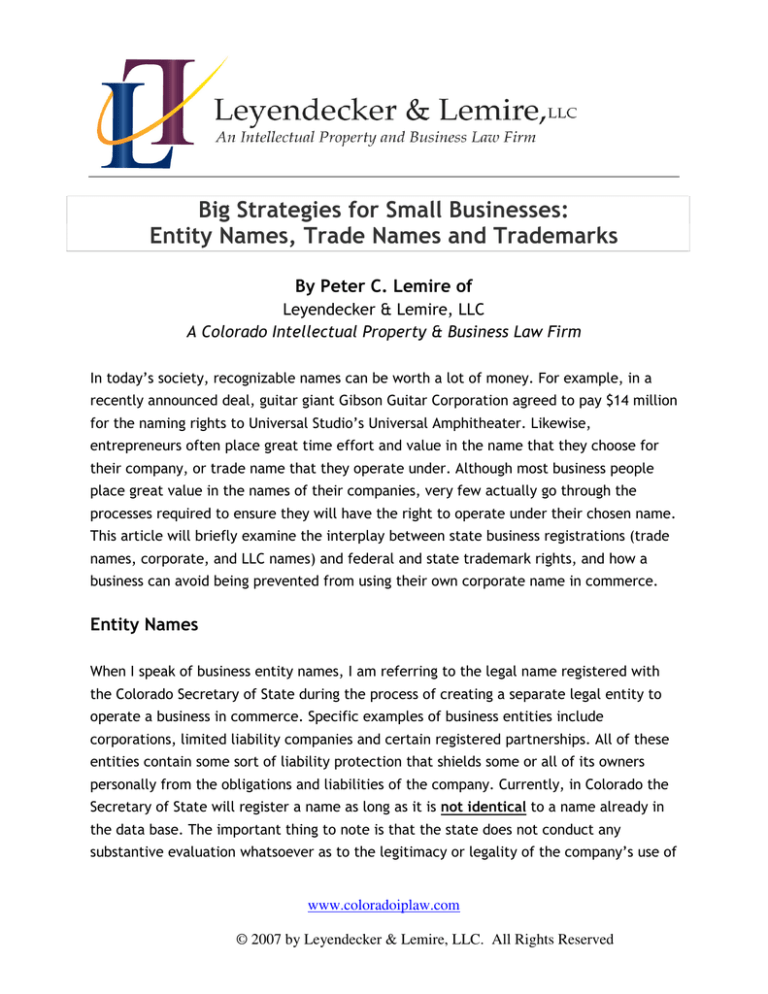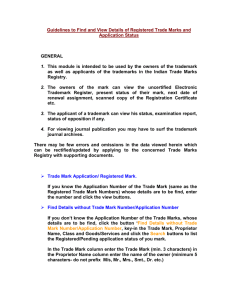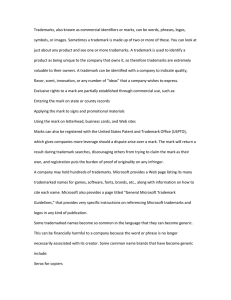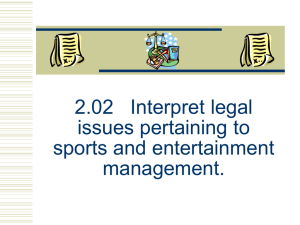
Big Strategies for Small Businesses:
Entity Names, Trade Names and Trademarks
By Peter C. Lemire of
Leyendecker & Lemire, LLC
A Colorado Intellectual Property & Business Law Firm
In today’s society, recognizable names can be worth a lot of money. For example, in a
recently announced deal, guitar giant Gibson Guitar Corporation agreed to pay $14 million
for the naming rights to Universal Studio’s Universal Amphitheater. Likewise,
entrepreneurs often place great time effort and value in the name that they choose for
their company, or trade name that they operate under. Although most business people
place great value in the names of their companies, very few actually go through the
processes required to ensure they will have the right to operate under their chosen name.
This article will briefly examine the interplay between state business registrations (trade
names, corporate, and LLC names) and federal and state trademark rights, and how a
business can avoid being prevented from using their own corporate name in commerce.
Entity Names
When I speak of business entity names, I am referring to the legal name registered with
the Colorado Secretary of State during the process of creating a separate legal entity to
operate a business in commerce. Specific examples of business entities include
corporations, limited liability companies and certain registered partnerships. All of these
entities contain some sort of liability protection that shields some or all of its owners
personally from the obligations and liabilities of the company. Currently, in Colorado the
Secretary of State will register a name as long as it is not identical to a name already in
the data base. The important thing to note is that the state does not conduct any
substantive evaluation whatsoever as to the legitimacy or legality of the company’s use of
www.coloradoiplaw.com
© 2007 by Leyendecker & Lemire, LLC. All Rights Reserved
the name in commerce. Therefore, the Secretary of State’s acceptance of the name is
not an affirmation or endorsement of the company’s right to use the name in commerce.
Furthermore, the mere existence of a business registration does not inherently grant the
right to prevent some other company from using the same or similar name to describe
their company, products, or services. Therefore, a corporation with the name of XYZ, Inc.
could be prevented from using that name if another company or individual has a prior or
better right (i.e., trademark rights) to the use of the term XYZ in commerce. This could
happen even if the other company is out of state and doesn’t do business in Colorado.
Likewise, just strictly looking at the law surrounding entity names in Colorado, our friends
at XYZ, Inc. could not prevent the use of XYZ, Corp., XYZ Incorporated, X.Y.Z., Inc. or
XYZ, LLC from being used as a company name by another party – even a direct
competitor.
Trade Names
There seems to be a lot of confusion about what trade names actually are and are not.
Quite simply, a trade name is an allowance by the State for a company or individual to
use or display to the public a name other than its legal name. Most often this occurs with
sole proprietorships. For example, if Joe Smith is operating a coffee shop as a sole
proprietor and wants to operate as Mile High Coffee, he will need to file for the trade
name Mile High Coffee because he is operating by another name than his legal name
which would be Joe Smith. Corporations, LLC’s and partnerships can also operate under
trade names. For example a company whose legal name is Dreams Unlimited, Inc. would
need to file a trade name to hold itself out to the public as Wilderness Adventures. Many
times companies will file trade names in order to have a more consumer friendly
appearance, or to be able to advertise without having to include the Inc., Corp., LTD., or
LLC designators. Additionally, trade names are used extensively with franchises where the
franchisee creates a company to own and operate the business, but then does business
under the franchised name of Subway, McDonalds, or Burger King, etc.
www.coloradoiplaw.com
© 2007 by Leyendecker & Lemire, LLC. All Rights Reserved
Basically, a trade name is a way for consumers to find out who they are doing business
with. If I have formed a corporation called XYZ Corp. but do business as ABC Unlimited,
the State wants to have a paper trail so consumers, creditors, or other interested parties
to easily find out who ABC Unlimited is. Essentially, a trade name certificate is nothing
more than a record keeping tool.
So, now that we have taken a look at what trade names actually do, let’s take a look at
what they do not do. First and foremost – TRADE NAMES DO NOT GRANT AN EXCLUSIVE
RIGHT TO USE THE NAME. Let me say it again – trade names do not grant an exclusive
right to use the name. In fact, when applying for a trade name there usually is no
examination of whether or not anyone else is using the name. Therefore, it is quite
possible, and depending on the name more likely probable that the State has issued trade
name certificates to any number of different individuals or companies. Since it is
essentially a record keeping tool, the State doesn’t really care too much about more than
one entity using the same trade name. And while a trade name is an authorization to use
a certain name in commerce, it does not prevent another company or individual that has
a better right to use the name in commerce (i.e., trademark rights) from prohibiting you
from using your trade name. Additionally, unless you have a superior right to use a
certain name (once again through trademark rights) you cannot prevent another company
from using the name just based on the fact that you have an identical trade name.
So now, the big question is if trademark rights can trump entity names and trade names,
what are trademarks, how do they arise, and how can business owners protect
themselves?
Trademarks
All of the previously discussed factors lead to an all too common situation where a client
will come into my office holding a cease and desist letter from another company
demanding that the potential client immediately cease using their company name in
commerce or face a lawsuit. The potential client is most often upset and truly confused
www.coloradoiplaw.com
© 2007 by Leyendecker & Lemire, LLC. All Rights Reserved
as to why they can’t use the name – after all the state of Colorado said it was OK. The
unfortunate situation is due to the interaction of the rules regarding entity/trade names
and trademark law. However, there are things you can do to protect yourself to make
sure that you will be able to use your name in commerce and prevent others from using
the same name.
If you have been paying attention to this article, you may have noted that I referred to
trademark rights as a right that may “trump” your right to use a certain name in
commerce. This is due to the fact that trademark rights not only authorize you to use the
mark in commerce, but also they allow you to exclude others from using the mark as
well.
Trademark rights arise from an individual or company’s use of a mark to identify their
goods and services in commerce. Most commonly, you can think of trademarks as brands,
brand names, or product model names. However, company names in certain
circumstances may also be trademarked. In trademark law, it’s the companies’ use and
the first date that they used the mark that is important. Additionally, you have to
continue to use the mark to have rights in it. In general, a mark is most likely to be
deemed abandoned if you haven’t used it in the last three years.
When we talk about trademarks, we always discuss them in the context that they are
used. For example, SPAM for processed meat. Incidentally, Hormel Foods, LLC, the maker
of SPAM, not only has a federally registered trademark for SPAM regarding processed
meat, they also have federal registrations for SPAM covering poultry, deviled luncheon
meat spread, retail gift shop services, educational and entertainment services, magnets,
jewelry, playing cards, pens, pencils, note cubes, mugs/insulated beverage containers,
tennis balls, golf balls, money banks, toys and entertainment services. So far, Hormel has
6 separate federal registrations for the word SPAM.
In a broad sense, you can lump trademarks into two different categories 1) registered
marks and 2) unregistered marks, which are also referred to as common law marks.
www.coloradoiplaw.com
© 2007 by Leyendecker & Lemire, LLC. All Rights Reserved
Common law marks arise when the mark is associated with goods or services in
commerce. A common law mark is identified by the superscript TM which appears after
the mark. In general, the protection of a common law mark extends to the areas that it is
actually used. Therefore if you are not selling or advertising in a certain area you do not
have the right to exclude someone else from using the mark in that area.
Basically, there are two jurisdictions for registered marks: State Marks and Federal Marks.
Since trademark rights arise from use and not registration, you do not have to register the
marks to be valid – you could rely on common law rights. However, registered marks do
receive some extra added benefits over common law marks. If you are selling goods or
services in a particular state, you may be eligible to register a mark in that state. State
marks are governed by the law in that particular state, so each will be different. In
general, most state statutes grant protection on a state-wide basis regardless of whether
you are actually using it just in one city or town or throughout the whole state. If you are
selling goods or services in interstate commerce (at a minimum you have to have sales
between 2 states) you may be eligible for a federally registered trademark. Federally
registered trademarks are nationwide in scope. Therefore, your protection applies to the
whole nation even if you are just selling goods or services between two states: Colorado
and New Mexico, for example.
Trademark infringement is judged on a standard that is called “likelihood of confusion.”
There are many different factors to determine whether one mark infringes the other, but
for ease of discussion it can be boiled down to: whether a reasonable person, upon
seeing both marks, would conclude that the products or services came from the same
individual or company, or that the products or services were somehow affiliated with
each other. Therefore, the marks need not be exactly the same and they need not be
used on the exact same products or services to create a likelihood of confusion. If it is
deemed that your use of the mark infringes on another mark, you could be forced to stop
using the mark and in some cases you could be liable for damages to the other party.
Given the above discussion of trademarks, it is apparent how another company could
www.coloradoiplaw.com
© 2007 by Leyendecker & Lemire, LLC. All Rights Reserved
prevent you from using your company name. If 1) they have trademark rights that extend
to the geographic area that you are selling your goods or services in, 2) their use
predates your use, and 3) if the marks and goods/services are close enough to cause a
likelihood of confusion, then you could be infringing on their mark.
If you are looking at launching a product or service, seek out a trademark attorney to
conduct a clearance search, even if you aren’t planning on registering your trademark
immediately. This will help minimize the chance that you will be infringing on some other
already existing product or service. Secondly, when forming a new corporation, LLC,
partnership, or when filing for a trade name, take a quick trip to the United States Patent
and Trademark office web site www.uspto.gov to do a search of federally registered
trademarks. While this isn’t a fool-proof method, it will alert you to obvious situations
where the mark might already be taken by someone with a nation-wide scope of
protection. Lastly, you can prevent others from coming into the market with a name or
product name that causes a likelihood of confusion with your products or services by
registering your mark either on the state or federal level. State and Federal registrations
will pop up on clearance searches and can help in cutting down on infringers.
Additionally, state and federal registration can be a good tool for pressuring infringers to
comply with cease and desist letters before having to resort to litigation, as they can
show independent third-party verification of your right to use the mark (however there
are a small number of states, such as Colorado where state registration only indicates a
party’s “claim to ownership”, and does not confer any substantive rights to the mark
itself).
While not everything can be fool-proof, business owners can do a lot to prevent a
situation where they are forced to change a product, service, or company name years
down the line after they have spent substantial time, money and effort establishing name
recognition for their business or products.
About the Author -
www.coloradoiplaw.com
© 2007 by Leyendecker & Lemire, LLC. All Rights Reserved
Mr. Lemire is a Founding Member of the law firm of Leyendecker Lemire LLC, specializing in business and
intellectual property law. Previously, Mr. Lemire served as in house counsel to various companies in the
Denver Metro area in industries ranging from high tech ".com’s" to strategic investment firms specializing in
the purchase and sale of distressed commercial debt. Mr. Lemire has advised companies on issues such as
general corporate and business law, employment law, mergers and acquisitions, contract drafting and
negotiation, software licensing, strategic relationships, copyright, trademark and cyberlaw. He is a Member
of the Colorado Bar Association, the American Bar Association’s (ABA) Business Law section, the ABA
Cyberspace Law and Internet Law Committees as well as the ABA’s subcommittee on Electronic Commerce,
as well as the Secretary of State’s Legislative Drafting Committee on Trademarks.
Peter Lemire can be contacted at (303) 768-0123 peter@lld-law.com
DISCLAIMER: This article is intended to be General Information and does not constitute legal advice.
Anyone with questions concerning any of the topics addressed in this article are suggested to seek
competent legal counsel.
www.coloradoiplaw.com
© 2007 by Leyendecker & Lemire, LLC. All Rights Reserved




